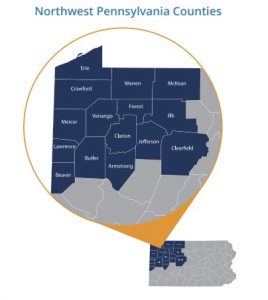Emerging PTSD Treatments for Veterans
 The Northwest Pennsylvania (NW PA) Veteran Suicide Prevention Program operates on a three-pronged approach involving healthcare providers, community organizations, and Veterans and their families in the 15 counties of NW PA.
The Northwest Pennsylvania (NW PA) Veteran Suicide Prevention Program operates on a three-pronged approach involving healthcare providers, community organizations, and Veterans and their families in the 15 counties of NW PA.
This article summarizes a recent journal club presentation and interview with Dr. Ingmar Gorman, co-founder of Fluence, a continuing education organization in the emerging field of psychedelic therapy. Topics covered include:
- An overview of post-traumatic stress disorder (PTSD) and its effects
- Understanding MDMA
- Organizations working to improve access to MDMA therapy for Veterans
- How clinicians and behavioral healthcare administrators can learn more about MDMA
Read time: 7 minutes
A pdf of the presentation, including sources, and accompanying research article is available for download.
PTSD Overview
 Post-traumatic stress disorder (PTSD) is an anxiety disorder that develops in reaction to physical injury or severe mental or emotional distress. The effects of PTSD can include unexpected attacks of paranoia, flashbacks, depression, hopelessness, suicidal thinking, insomnia, hypervigilance, headaches, social isolation, and other kinds of suffering. PTSD is common in military Veterans who’ve been on active duty or experienced direct combat.
Post-traumatic stress disorder (PTSD) is an anxiety disorder that develops in reaction to physical injury or severe mental or emotional distress. The effects of PTSD can include unexpected attacks of paranoia, flashbacks, depression, hopelessness, suicidal thinking, insomnia, hypervigilance, headaches, social isolation, and other kinds of suffering. PTSD is common in military Veterans who’ve been on active duty or experienced direct combat.
As 2023 closes, research into psychedelic-assisted therapy for numerous mental health conditions, including PTSD, reaches the 15-year mark. One of the most promising and notable treatments is MDMA-assisted therapy for PTSD. The VA has conducted clinical trials in this area, and others throughout the US are in the pipeline.
Understanding MDMA
 According to the National Institute for Health, MDMA is a synthetic drug that produces an energizing effect, distortions in time and perception, and enhanced enjoyment from sensory experiences. It can also increase self-awareness and empathy. In its illegal use, MDMA is often referred to as “ecstasy” and sold in tablet or capsule form. Illegally purchasing the drug can subject the user to harmful adulterants such as methamphetamine, the anesthetic ketamine, caffeine, the diet drug ephedrine, the over-the-counter cough suppressant dextromethorphan, heroin, phencyclidine (PCP), or cocaine.
According to the National Institute for Health, MDMA is a synthetic drug that produces an energizing effect, distortions in time and perception, and enhanced enjoyment from sensory experiences. It can also increase self-awareness and empathy. In its illegal use, MDMA is often referred to as “ecstasy” and sold in tablet or capsule form. Illegally purchasing the drug can subject the user to harmful adulterants such as methamphetamine, the anesthetic ketamine, caffeine, the diet drug ephedrine, the over-the-counter cough suppressant dextromethorphan, heroin, phencyclidine (PCP), or cocaine.
While MDMA in its pure, pharmaceutical form is not currently legal in the US, there is hope that it will be approved as a physician-prescribed medication by 2025. The nonprofit group Reason for Hope is developing and advocating for the legal reforms needed to enable safe and affordable access to MDMA- and psychedelic medicine and therapies through access to pilot programs.
Their team, led by retired Marine three-star Lieutenant General Martin Steele, Lynnette Averill, Ph.D., and Brett Waters, Esq., drafts legislation, prepares legal briefings and policy proposals, testifies in hearings, educates legislators and government officials, and builds broad advocacy coalitions. The work Reason for Hope has undertaken is bearing fruit as legislation was recently passed in Connecticut establishing an MDMA- and psilocybin-assisted therapy pilot program with funding for qualified patients. The group is working on similar legislation in New York, Pennsylvania, and other states nationwide alongside a broad coalition of advocacy groups.
Continuing Education Opportunities
 With psychedelic therapy moving from the realm of research into clinical practice, the need for education and awareness expands. Fluence, co-founded by Dr. Ingmar Gorman, offers ethically structured continuing education in psychedelic integration and psychedelic-assisted therapy for “above ground” clinicians, administrators of behavioral and mental health practices, and lay persons wanting to understand the history of psychedelics and clinical research. Gorman received his clinical training in New York City at the New School for Social Research, Mount Sinai Beth Israel Hospital, Columbia University, and Bellevue Hospital and has published extensively on the topics of classic psychedelics, ketamine, MDMA, and Psychedelic Harm Reduction and Integration.
With psychedelic therapy moving from the realm of research into clinical practice, the need for education and awareness expands. Fluence, co-founded by Dr. Ingmar Gorman, offers ethically structured continuing education in psychedelic integration and psychedelic-assisted therapy for “above ground” clinicians, administrators of behavioral and mental health practices, and lay persons wanting to understand the history of psychedelics and clinical research. Gorman received his clinical training in New York City at the New School for Social Research, Mount Sinai Beth Israel Hospital, Columbia University, and Bellevue Hospital and has published extensively on the topics of classic psychedelics, ketamine, MDMA, and Psychedelic Harm Reduction and Integration.
For Veterans and their families wanting to know if MDMA-assisted therapy can help with PTSD and mental health concerns, Gorman is quick to point out that it’s essential to speak with a therapist or doctor first. “Become familiar with the current research the Bronx VA is doing and start discussing its appropriateness for the condition. MDMA raises concerns for those with bipolar disorder, mania, or psychosis, and this is why working with a trained therapist or informed physician is important.”
While past research studies included individuals with a history of substance use disorder (SUD), those with active SUD were excluded. However, the evidence shows that treating with MDMA does not result in cravings for substances, an important concern for those in recovery. Says Gorman, “There has been no evidence that the concern of ‘will taking this drug make me want to return to taking drugs’ plays out over time. While MDMA does have a dependency profile higher than psilocybin, it is not as high as cocaine or opioids. In the clinical trials, when MDMA is administered, we do not see people misusing or showing a dependency. But it’s important to remember each person is unique. Outside of the controlled context, there are cases of people using MDMA in a harmful way, which is why working with a therapist or doctor familiar with your history is so important.”
Additional Resources
Gorman recommends MAPS.org as the trusted source of information for people wanting to understand better this form of treatment and Heroic Hearts, which focuses on helping Veterans diagnosed with PTSD. Additionally, clinicaltrials.gov provides information on all MDMA and PTSD clinical trials. Visit the website and put those words in the search terms.
Want to learn more about the history of psychedelics and clinical research? Fluence’s introductory workshop, Premise & Promise, explores this history in more detail.
Looking to Get Involved?
 Whether you identify as a healthcare provider, community organization, or Veteran, there are several opportunities through the NW PA Veteran Suicide Prevention Program and PERU to connect to resources, participate in educational training, and promote harm reduction strategies. We are actively recruiting healthcare and community partners to work with us in meeting our goals and objectives. To learn more, visit the program website at theresilientveteran.org.
Whether you identify as a healthcare provider, community organization, or Veteran, there are several opportunities through the NW PA Veteran Suicide Prevention Program and PERU to connect to resources, participate in educational training, and promote harm reduction strategies. We are actively recruiting healthcare and community partners to work with us in meeting our goals and objectives. To learn more, visit the program website at theresilientveteran.org.
Need Help? Know Someone Who Does? Contact the National Suicide Prevention Lifeline at 988 or use the online Lifeline Crisis Chat. Both are free and confidential. You’ll be connected to a skilled, trained counselor in your area.

